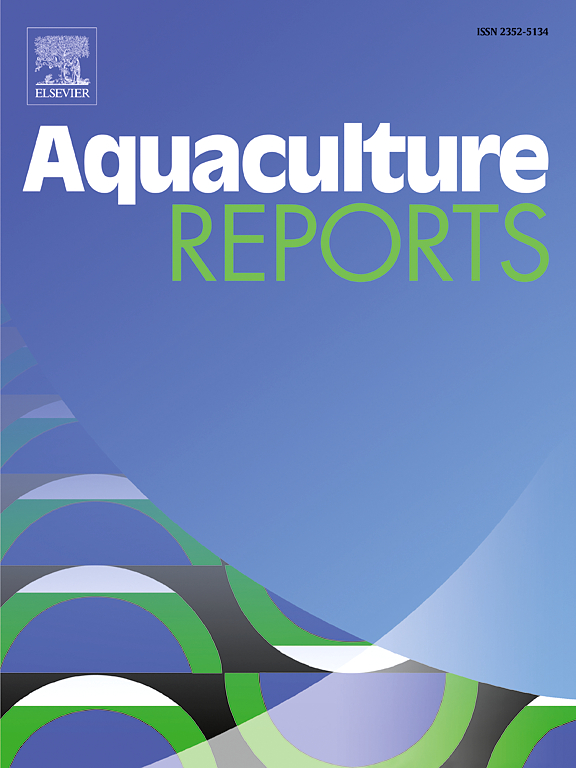肌肉转录组分析揭示了低温对克氏原螯虾生长的影响
IF 3.7
2区 农林科学
Q1 FISHERIES
引用次数: 0
摘要
温度是影响甲壳类动物生长、发育、繁殖和免疫的重要环境因素。温度对甲壳类动物生长的影响已被广泛研究,但具体的分子机制尚不完全清楚。本研究将克氏原螯虾在不同温度(10℃、18℃、26℃)下培养3周,26℃时生长最快,18℃次之,10℃时生长最慢。对小龙虾肌肉进行转录组测序分析,共获得14012个基因。以(|log2FC≥1)和(q值<; 0.05)为标准,鉴定差异表达基因。通过GO和KEGG分析发现,低温下克氏杆菌的氨基酸代谢、脂质代谢、多糖代谢和能量代谢发生了变化。小龙虾肠道内消化酶的活性也随温度的降低而降低。这些结果表明,低温通过影响小龙虾的代谢和酶活性来影响小龙虾的生长。总之,这些结果将有助于我们进一步了解低温影响克氏杆菌生长的分子机制。本文章由计算机程序翻译,如有差异,请以英文原文为准。
Transcriptome analysis of muscles reveals the effect of low temperature on the growth of Procambarus clarkii
Temperature is an important environmental factor for crustaceans that can affect their growth, development, reproduction, and immunity. The effect of temperature on the growth of crustaceans has been widely studied, but the specific molecular mechanisms are not fully understood. In this study, Procambarus clarkii were cultured at different temperatures (10°C, 18°C, and 26°C) for 3 weeks and grew the fastest at 26°C, followed by 18°C, and the slowest at 10°C. Transcriptome sequencing analysis was performed on the muscles of crayfish, and a total of 14,012 genes were obtained. Based on the standard of (|log2FC ≥1) and (q-value < 0.05), differentially expressed genes were identified. Based on GO and KEGG analysis, it was observed that amino acid metabolism, lipid metabolism, polysaccharide metabolism, and energy metabolism in P. clarkii were altered at low temperatures. The activity of digestive enzymes in crayfish intestines also decreases with decreasing temperature. These results indicate that low temperature affects the growth of crayfish by affecting their metabolism and enzyme activity. Overall, the results will be useful to improve our understanding of the molecular mechanisms of low-temperature affecting P. clarkii growth.
求助全文
通过发布文献求助,成功后即可免费获取论文全文。
去求助
来源期刊

Aquaculture Reports
Agricultural and Biological Sciences-Animal Science and Zoology
CiteScore
5.90
自引率
8.10%
发文量
469
审稿时长
77 days
期刊介绍:
Aquaculture Reports will publish original research papers and reviews documenting outstanding science with a regional context and focus, answering the need for high quality information on novel species, systems and regions in emerging areas of aquaculture research and development, such as integrated multi-trophic aquaculture, urban aquaculture, ornamental, unfed aquaculture, offshore aquaculture and others. Papers having industry research as priority and encompassing product development research or current industry practice are encouraged.
 求助内容:
求助内容: 应助结果提醒方式:
应助结果提醒方式:


